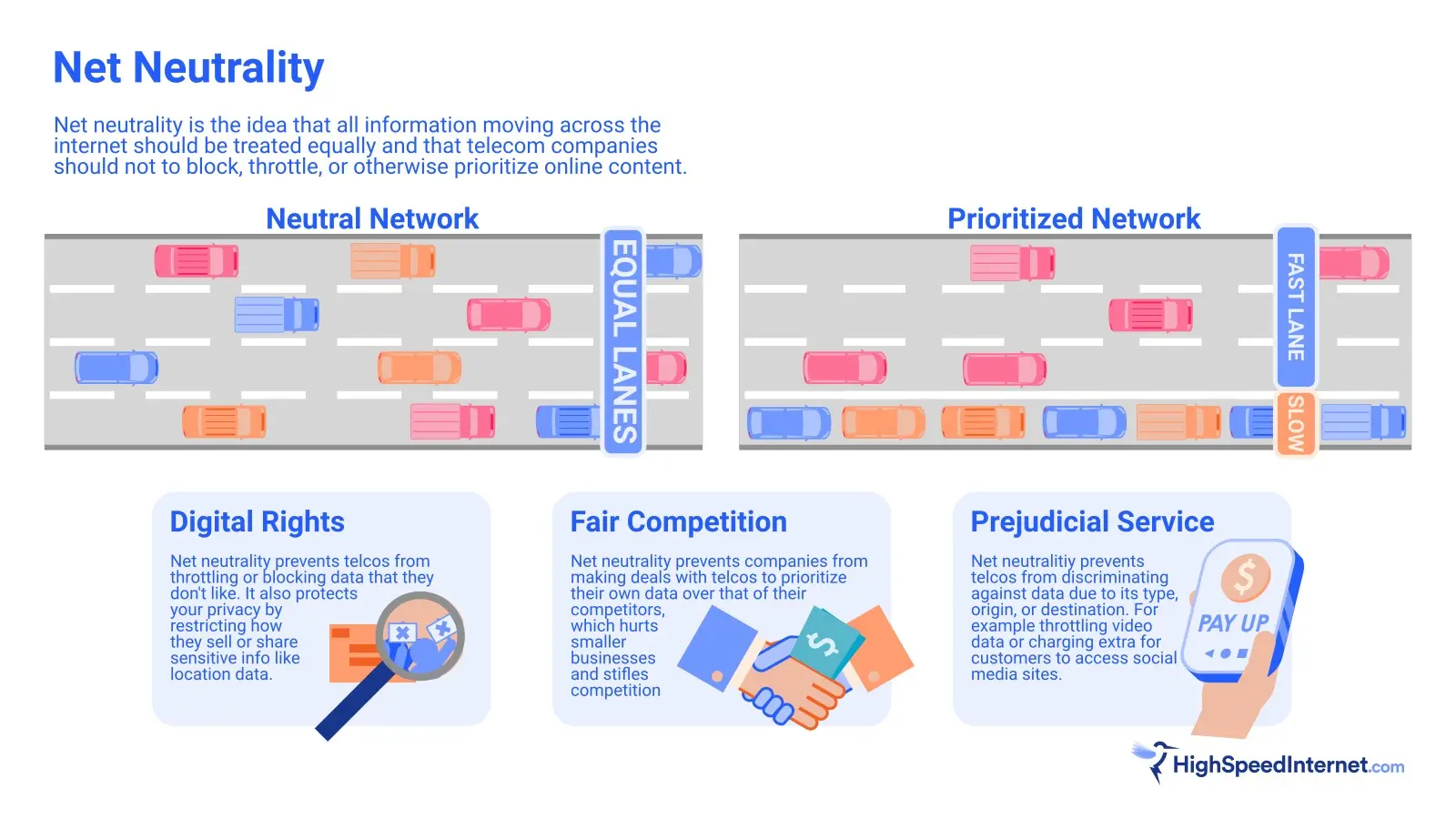What Is Net Neutrality and Why Is it Important?
Mar 25, 2025 | Share
Technology
The principle of net neutrality directly affects anyone who uses the internet, as it deals with the type of content they can access and the ways they can be charged for their internet use. Network neutrality, or the non-discrimination rule, is the idea that the internet service providers (ISPs) who own the network infrastructure that the internet uses shouldn’t be allowed to discriminate against and restrict the information that flows across their networks.
Net neutrality protections were repealed in 2017, but were reinstated by the FCC in April, 2024. In July of that year, the reinstated protections were temporarily blocked by the Sixth Circuit U.S. Court of Appeals, which eventually overturned them.
Although the question of net neutrality has been around since the early days of the internet, it has become a contentious political issue in the last few years, dividing the FCC and prompting protests. Whether you’re an ardent supporter of net neutrality or reading about it for the first time, we’re going to walk you through the basics and what it means to you.
What is net neutrality?
Net neutrality is the principle that all information moving across the internet should be treated equally by those who operate the networks that make up the internet. This means that internet service providers (ISPs) should not block, slow down, or otherwise penalize users based on the content, source, or destination of internet communication.
Net neutrality is central to the utopian vision of the internet as a free and fair medium of communication. Not everyone can run an ad during the Super Bowl or get their experimental film shown in movie theaters, but anyone can make a website that can be viewed worldwide. This mythos doesn’t just exist in the hearts of idealistic tech entrepreneurs; it’s embedded in almost every advertisement for internet services we see. The high-speed fiber plan or the cool new app could be the start of your new career or your chance at viral internet fame.
Even if you’re not one to wax poetic about the infinite potential of the internet, it’s still a remarkable and complex system of technology. Just accessing a single webpage involves breaking your data into tiny packets, sending those packets across many different networks owned by different companies (and often in different countries), and then collecting and reassembling them on your home computer. Because anything you do on the internet requires your data to travel across multiple networks to reach you, it matters how all those networks handle your data.

Under net neutrality, the networks that your data packets cross are only allowed to pass them on toward their destination. Without net neutrality, these networks are allowed to treat your data however they want and choose what information users can access.
Why is net neutrality controversial?
Although it’s easy to frame net neutrality as simply a battle with average internet users on one side and evil corporations on the other, it’s a bit more complicated than that. Many of the biggest tech companies like Google and Facebook are in favor of net neutrality. If both individual users and the largest corporations are on the same side, why is anyone against net neutrality?
The arguments against net neutrality
The groups most opposed to net neutrality include the ISPs that own the physical infrastructure of the internet and companies that are involved with the manufacture of this hardware. They argue that net neutrality protections could have a number of negative effects:
- Interfering with network management
- Discouraging investment
- Stifling competition
- Creating unnecessary regulations
ISPs argue that since net neutrality prevents discrimination of internet traffic, they lose the ability to prioritize critical information crossing their networks, such as data communicating with a medical device, while delaying less important or useless information like spam. The ability to filter based on message content could also allow them to add features that increase the performance of activities like video calls that are much more demanding than normal internet traffic.
Opponents of net neutrality, like former FCC commissioner Ajit Pai, claim that net neutrality protections will discourage ISPs from investing in their own networks by preventing them from adding features that rely on traffic discrimination. If internet infrastructure is as mundane as the pipes that bring water to your home, why would an ISP invest more than the bare minimum into their networks?
Pai further reasons that by discouraging investment, competition will also be hurt, as smaller ISPs will have less incentive to enter the market. He argues that a “light-touch” approach will preserve the profitability of broadband providers and attract new companies to the market.
Additionally, many proponents of small government argue that the benefits of net neutrality simply aren’t enough to justify regulations. Even if net neutrality protections do offer benefits to the average consumer, these benefits aren’t enough to justify placing restrictions on what ISPs can do with their own networks. This is why opponents of net neutrality often (somewhat confusingly) frame their position as defending the open internet—open for telecom companies, not the average user.
The arguments for net neutrality
Groups in favor of net neutrality include many big tech companies, as well as consumer advocates, human rights organizations, and many individual internet users. They argue that net neutrality is essential for the continued existence of a free and open internet for several reasons:
- Preserving digital rights and freedoms
- Maintaining reliable service
- Encouraging competition and investment
- Preventing prejudicial service
One of the most repeated arguments in favor of net neutrality is that it is necessary to preserve Americans’ rights, such as their right to privacy, and to promote free speech and democratic participation online. Net neutrality prevents ISPs from discriminating based on the content of online communications or the parties involved. Without these protections, it would be legal for an ISP to throttle or block traffic to certain sites, such as those of their competitors or of political groups the company disagrees with.
Net neutrality isn’t just important to what we do online, but also to how the internet functions. The design of modern computer networks is based on assumptions like the end-to-end principle or the idea that most functions like security and error checking only happen at the start and end of an information packet’s journey. The only job of all the network nodes between the start and end points is to pass the information on to the next step of its journey. Scholars like Lawrence Lessig and Robert W. McChesney have argued that this design is why the internet is such a powerful tool and that meddling with this design would allow the internet as we know it today to die.
Net neutrality proponents also argue that, contrary to the claims of ISPs, net neutrality encourages competition and investment, rather than stifling it. The fact that even the smallest new business can have a web presence from its start has been cited by organizations such as the Electronic Frontier Foundation and the Obama administration as a key factor in innovation and economic growth in the U.S. Without these protections, as Mike Orcutt of the MIT Technology Review notes, many smaller companies are worried that ISPs, which have near monopolies in many areas, would be free to engage in even more anti-competitive practices.
While it’s a bit confusing to see different groups framing net neutrality as either essential or antithetical to competition and innovation, it helps to look at the specific cases that each side uses as evidence. Opponents of net neutrality generally only discuss the specific impact it has on telecom companies (and some smaller telecoms disagree). As economist Nicholas Economides argues, “The only businesses that benefit from violations of net neutrality are ISPs. If you think about it, 95 percent of businesses in the U.S. are not ISPs.”
Finally, net neutrality protects both consumers and businesses from prejudicial services, such as paid internet “fast lanes.” These are features that would allow certain traffic on a provider’s network to have priority, thus slowing down all other traffic. While ISPs point out that this could be used to improve the performance of certain online activities, many other groups point out that it could also be used to charge website owners for the privilege of fast access, undoing the level playing field between small businesses and huge corporations and making the internet a “pay to play” model. If this sounds less like a new feature and more like a thinly-veiled threat, you’re not alone. Scholars such as Tim Wu (who coined the term “net neutrality”) have dubbed this the “Tony Soprano vision of networking” where providers extract payments based on their established market power, rather than by providing additional value to customers.
The history of net neutrality
Although the term “net neutrality” wasn’t coined until 2003, this basic idea has been built into the design of the internet since its origins in the 1960s. Designed to be decentralized and resilient, the internet takes information from one location, breaks it up into tiny packets of data, and then sends these data packets across multiple paths to reach their destination. The routers between these two endpoints do their jobs completely autonomously and as fast as they can. If any router on the network goes down, the information is simply routed through a different path. No point in the network is essential, and none can act as gatekeepers for the rest of the network.
These fundamental design principles came into question in the 2000s, particularly when the FCC ruled against Comcast for interfering with its customers’ use of file-sharing programs like BitTorrent. Comcast appealed this decision, and the Circuit Court held that, although regulating an ISP’s interference in its customers’ internet use fell under the FCC’s general jurisdiction, enforcing net neutrality was outside the scope of the Commission’s current internet regulations. Thus, explicit rules protecting net neutrality needed to be created.
In May of 2010, the FCC introduced strong net neutrality protections, explicitly stating that service providers could not block websites or impose limits on users. Verizon filed a federal lawsuit challenging the order, which was successful in overturning it in 2014.
Following the overturn of the 2010 rules, the FCC opened a public comment period for its proposed internet regulatory structure. During the next four months, nearly 4 million Americans filed public comments on net neutrality—more than the FCC had ever received on any other issue.
In 2015, the FCC voted in favor of new rules for strong net neutrality protections. Prompted by the overwhelming public input, these rules addressed many of the legal loopholes and impracticalities of the previous order and gave clear and concise rules against blocking, throttling, and paid prioritization of internet traffic. These were once again challenged, but a federal court of appeals upheld them the following year.
Just two years later and under a new commissioner, Ajit Pai, the FCC repealed the net neutrality rules, setting off another wave of protests and legal challenges that continue to this day. Although a new commissioner was confirmed in 2021, the empty seat on the commission was left vacant by the U.S. Senate for three years, leaving the FCC in a 2-2 deadlock over net neutrality.
Unsurprisingly, many of the fears of net neutrality advocates were proven true after the repeal. In June 2018, Verizon throttled the internet connection of one of the vehicles of the Santa Clara Fire Department while it was attempting to coordinate the fighting of an ongoing wildfire. Although the department had specifically chosen an unlimited data plan to avoid that exact scenario, it turned out that providers play pretty fast and loose with what constitutes “unlimited” data. The department ultimately had to pay double its normal rate to get its speed restored. A similar instance of upselling during life-threatening circumstances was reported by a family trapped in their home by Hurricane Florence.
While the fire department incident is perhaps the most egregious example, there are countless others. One study found that at least 30 ISPs were specifically targeting users based on their use of video streaming services and throttling their connections. Sprint was found to be slowing traffic to Microsoft’s Skype, which is a competitor to Sprint’s own phone services. In Utah, CenturyLink blocked its customers’ internet access to show them an ad.
Such examples further galvanized the supporters of net neutrality and, in some cases, become part of lawsuits challenging the 2015 repeal.
On September 7, 2023, the Senate finally confirmed the fifth member of the FCC, fully staffing the commission for the first time in three years. With the deadlock broken, net neutrality and the future of the free and open internet was back in the spotlight began to heat up once again.
On April 3, 2024, the FCC announced that during its April meeting, it would be voting on a proposal to restore net neutrality. If adopted, this proposal would return popular net neutrality protections, provide oversight of broadband outages, boost security of broadband networks, increase consumer protections, and restore widely accepted national standards.
On April 25, the FCC voted 3–2 to reinstate net neutrality protections and designate internet service as a common carrier under Title II of the Communications Act. This vote also gave the FCC more oversight over internet outages, more power to boost network security, and a greater ability to provide consumer protections.
Following the reinstatement of net neutrality protections, members of the telecom industry challenged the FCC’s ruling. On July 12, it was placed on hold by the Sixth Circuit U.S. Court of Appeals. This hold was then extended and oral arguments for the appeal were scheduled for late October or early November, 2024.
The current state of net neutrality
On January 2, 2025, the Sixth Circuit ruled that the FCC did not have the legal authority to reinstate net neutrality rules. This was due to a ruling by the Supreme Court that came two months after net neutrality rules had been reinstated.
The case in question, Loper Bright Enterprises v. Raimondo, overturned a previous Supreme Court case that for 40 years had been the basis of federal agencies’ ability to pass statutes. With that ruling overturned, the Sixth Circuit determined that the Federal Communications Commission isn’t allowed to regulate communications.
While this seems like the end of net neutrality on the federal level, states are stepping in to protect their residents. In response to the Sixth Circuit’s ruling, Pennsylvania lawmakers have now proposed a bill to create net neutrality protections in their state. If passed, Pennsylvania would join other states, including California, Colorado, Maine, Oregon, Vermont, and Washington, that have all passed their own net neutrality legislation.
The bottom line
Net neutrality is an important issue that impacts not just people’s personal online freedom and privacy, but many of the basic assumptions that underpin the design of the modern internet. Changes to net neutrality protections govern what we can do online, how fast our internet service can be, and what we’re charged for our online activities.
One of our core values here at HighSpeedInternet.com is fighting for the benefit of our users. We believe that strong net neutrality protections benefit everyday internet users and allow them to get the most value out of the internet connection they pay for. We want the internet to be something that enables innovation and creativity. We want it to be something that makes people’s lives easier and more enjoyable, and we want it to help people improve their financial situations. We think that having a free and open internet is the best way to achieve those outcomes and hope that even if the FCC doesn’t share our perspective, the rest of us can still make it happen.
Author - Peter Christiansen
Peter Christiansen writes about telecom policy, communications infrastructure, satellite internet, and rural connectivity for HighSpeedInternet.com. Peter holds a PhD in communication from the University of Utah and has been working in tech for over 15 years as a computer programmer, game developer, filmmaker, and writer. His writing has been praised by outlets like Wired, Digital Humanities Now, and the New Statesman.




